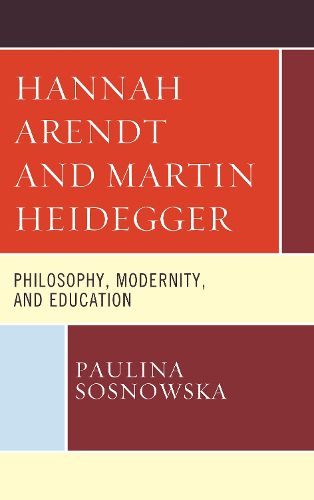Readings Newsletter
Become a Readings Member to make your shopping experience even easier.
Sign in or sign up for free!
You’re not far away from qualifying for FREE standard shipping within Australia
You’ve qualified for FREE standard shipping within Australia
The cart is loading…






The tragedy of totalitarianism, one of the most important turns in the modern philosophy and history of the West undergirds the intellectual relationship between Martin Heidegger and Hannah Arendt. The rise of totalitarianism caused the disruption of traditional metaphysical and political categories and the necessity of a painstaking forging of new languages for the description of reality.
This book argues that Arendt’s answer to Heidegger’s philosophy, intelligible only within the wider context of both thinkers’ struggles with the philosophical tradition of the West, also opens up a new horizon of conceptualizing the relationship between philosophy and education. Paulina Sosnowska develops Arendt’s thesis of the broken thread of tradition and situates it in the wider context of Heideggerian philosophy and his entanglement with Nazism, and consequently, questions the traditional relationship between philosophy and education. The final parts of this book return to the problem of dialogue between philosophy, thinking, and university education in times when the political and ethical framework is no longer determined by the continuity of tradition, but the caesura of twentieth-century totalitarianism.
$9.00 standard shipping within Australia
FREE standard shipping within Australia for orders over $100.00
Express & International shipping calculated at checkout
The tragedy of totalitarianism, one of the most important turns in the modern philosophy and history of the West undergirds the intellectual relationship between Martin Heidegger and Hannah Arendt. The rise of totalitarianism caused the disruption of traditional metaphysical and political categories and the necessity of a painstaking forging of new languages for the description of reality.
This book argues that Arendt’s answer to Heidegger’s philosophy, intelligible only within the wider context of both thinkers’ struggles with the philosophical tradition of the West, also opens up a new horizon of conceptualizing the relationship between philosophy and education. Paulina Sosnowska develops Arendt’s thesis of the broken thread of tradition and situates it in the wider context of Heideggerian philosophy and his entanglement with Nazism, and consequently, questions the traditional relationship between philosophy and education. The final parts of this book return to the problem of dialogue between philosophy, thinking, and university education in times when the political and ethical framework is no longer determined by the continuity of tradition, but the caesura of twentieth-century totalitarianism.